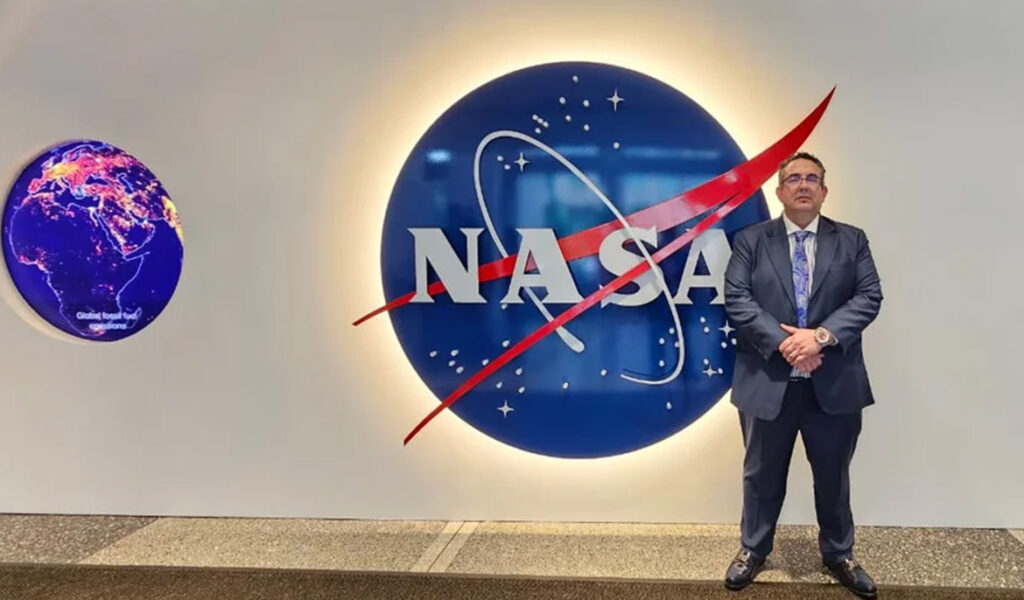Chief Scientist Demetris Skourides recently attended a ceremony at NASA headquarters in Washington DC in order to witness the Cypriot team “Brute Force” receiving the highest accolade at the esteemed NASA Space Apps Challenge.
This marked an unprecedented achievement for a team from Cyprus, celebrating their first invitation to such a prestigious event.
“We are incredibly proud of the Cypriot team, ‘Brute Force,’ for their remarkable achievement in the NASA Space Apps Challenge,” Skourides said in an announcement released on Thursday.
He continued by saying that “their success is a testament to the innovative spirit, technical expertise, and research excellence that Cypriot scientists foster in the field of space in pursuit of Cyprus space strategy 2022-2027 formulated by the Deputy Ministry of Research, Innovation and Digital Policy.”

The team received accolades for their Moonquake Map project, which outshone 3,094 projects from 162 countries.
This pioneering initiative aims to map seismic events on the Moon to better understand its internal structure, highlighting the technical prowess and innovative capabilities of the Cypriot scientific community.
The members of “Brute Force” — Constantinos Aristodemou, Marios Iacovou, Giorgos Evangelou, and Panagiotis Theodorou — have set a high standard in using space data to tackle real-world challenges.
The competition has been organised in Cyprus for the last 11 years by the Cyprus Space Exploration Organisation (CSEO), which plays a crucial role in promoting innovation and entrepreneurship within the national space ecosystem.
During his visit, Skourides also had discussions with NASA stakeholders, including Kent Bress, Acting Deputy Associate Administrator for the Office of International and Interagency Relations, and Karen St. Germain, Earth Science Division Director.
These meetings covered the National Space Strategy for 2022-2027, outlining Cyprus’ commitment to enhancing its space ecosystem with pillars including space technologies, space communication services, Earth observation, and space education and science.
Skourides also emphasised the strategic geographic position of Cyprus at the crossroads of Europe, Asia, and Africa, which not only enhances its connectivity but also elevates the Republic as a pivotal hub for space research and international cooperation.

“Our vision is to leverage this strategic advantage, complemented by a world-class research community and a sound innovation ecosystem that fosters solid relationships with European and global space agencies, research institutions, and industry leaders,” he said.
Furthermore, he introduced the Cyprus space ecosystem’s key enablers, including the Eratosthenes Centre of Excellence for Earth Observation & Environmental Change, and CSEO, as well as the establishment of a Space Incubation Centre to advance space-related business activity.
Key initiatives discussed included supporting startups in the global space industry, promoting research and product commercialisation, developing satellite-based services, and aiming for ESA Associate Membership by 2025.
Additionally, the importance of Artificial Intelligence in space research and exploration, particularly for the sustainability of planet Earth and supporting decision-makers in sectors like farming and agriculture, was underscored.
Recognising the transformative potential of the space sector, the government of Cyprus has made substantial investments in research and development.
A cornerstone initiative is the “Cyprus Space Research and Innovation Centre – C-SpaRC”, co-funded by the Research & Innovation Foundation (RIF) as a Strategic Infrastructure project, which aims to establish a global facility in Cyprus to foster entrepreneurship and innovation and attract global talent and investment.
During his discussions with Bress and St. Germain, Skourides affirmed the government’s support of C-SpaRC and potential cooperation with NASA in research and education in areas like human health, space engineering, water resource management, and ocean protection from space.
“CSEO has been instrumental in leading several innovative space projects, such as Project IN-TIME and Project EYE,” Skourides said.
“Their computational predictive modelling of space weather leverages advanced Artificial Intelligence and Machine Learning to spearhead scientific advancements”, he concluded.



